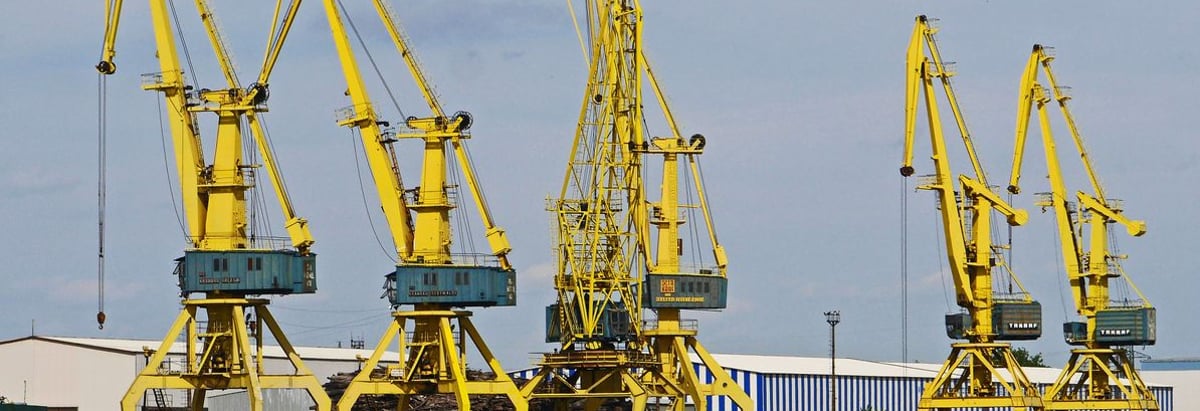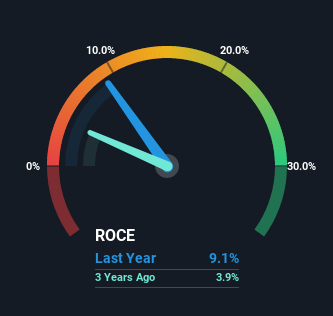- Malaysia
- /
- Energy Services
- /
- KLSE:ARMADA
Returns On Capital Are Showing Encouraging Signs At Bumi Armada Berhad (KLSE:ARMADA)

If you're looking for a multi-bagger, there's a few things to keep an eye out for. Amongst other things, we'll want to see two things; firstly, a growing return on capital employed (ROCE) and secondly, an expansion in the company's amount of capital employed. Put simply, these types of businesses are compounding machines, meaning they are continually reinvesting their earnings at ever-higher rates of return. So when we looked at Bumi Armada Berhad (KLSE:ARMADA) and its trend of ROCE, we really liked what we saw.
Return On Capital Employed (ROCE): What is it?
For those that aren't sure what ROCE is, it measures the amount of pre-tax profits a company can generate from the capital employed in its business. Analysts use this formula to calculate it for Bumi Armada Berhad:
Return on Capital Employed = Earnings Before Interest and Tax (EBIT) ÷ (Total Assets - Current Liabilities)
0.091 = RM918m ÷ (RM12b - RM1.7b) (Based on the trailing twelve months to March 2022).
Thus, Bumi Armada Berhad has an ROCE of 9.1%. In absolute terms, that's a low return but it's around the Energy Services industry average of 7.6%.
View our latest analysis for Bumi Armada Berhad

In the above chart we have measured Bumi Armada Berhad's prior ROCE against its prior performance, but the future is arguably more important. If you're interested, you can view the analysts predictions in our free report on analyst forecasts for the company.
What Does the ROCE Trend For Bumi Armada Berhad Tell Us?
It's great to see that Bumi Armada Berhad has started to generate some pre-tax earnings from prior investments. The company was generating losses five years ago, but now it's turned around, earning 9.1% which is no doubt a relief for some early shareholders. Additionally, the business is utilizing 39% less capital than it was five years ago, and taken at face value, that can mean the company needs less funds at work to get a return. Bumi Armada Berhad could be selling under-performing assets since the ROCE is improving.
In Conclusion...
In summary, it's great to see that Bumi Armada Berhad has been able to turn things around and earn higher returns on lower amounts of capital. Astute investors may have an opportunity here because the stock has declined 49% in the last five years. That being the case, research into the company's current valuation metrics and future prospects seems fitting.
If you'd like to know about the risks facing Bumi Armada Berhad, we've discovered 1 warning sign that you should be aware of.
While Bumi Armada Berhad may not currently earn the highest returns, we've compiled a list of companies that currently earn more than 25% return on equity. Check out this free list here.
Valuation is complex, but we're here to simplify it.
Discover if Bumi Armada Berhad might be undervalued or overvalued with our detailed analysis, featuring fair value estimates, potential risks, dividends, insider trades, and its financial condition.
Access Free AnalysisHave feedback on this article? Concerned about the content? Get in touch with us directly. Alternatively, email editorial-team (at) simplywallst.com.
This article by Simply Wall St is general in nature. We provide commentary based on historical data and analyst forecasts only using an unbiased methodology and our articles are not intended to be financial advice. It does not constitute a recommendation to buy or sell any stock, and does not take account of your objectives, or your financial situation. We aim to bring you long-term focused analysis driven by fundamental data. Note that our analysis may not factor in the latest price-sensitive company announcements or qualitative material. Simply Wall St has no position in any stocks mentioned.
About KLSE:ARMADA
Bumi Armada Berhad
An investment holding company, engages in providing marine transportation, floating production storage offloading (FPSO) operations, and engineering and maintenance services to offshore oil and gas companies.
Undervalued with excellent balance sheet.
Market Insights
Community Narratives



